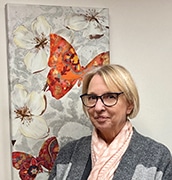A Matter Of Balance – Fall Prevention program
 By Ann Gorrin
By Ann Gorrin
Each year, more than one in three Americans over age 65 will fall. Most are not seriously injured; however, each year millions of patients are admitted to emergency departments for fall-related injuries, including hip and skull fractures. Falls can result in some of the most expensive injuries to treat. Now imagine a program designed to manage an older person’s risk and fear of falling.
In Delaware, seniors can attend a program called A Matter of Balance, which addresses falling and the fear of falling. This program is licensed to the State’s Volunteer Delaware 50+ program by MaineHealth’s Partnership for Healthy Aging. Through a series of eight 2-hour classes, participants sort out their fall risk and work through risk factors in their homes and personal lives that contribute to their fear of falling. In this issue, we will focus on why older people fall and scratch the surface on how to prevent it. According to the CDC, adults over age 65 who fall are two to three times more likely to fall again. Of those that fall repeatedly, as many as one in 10 may not be able to live independently again. The CDC reports 25,000 lives each year are lost to fall-related injuries making this the leading cause of death among older Americans. The number of deaths each year is said to be on the rise.
The cost of health care is also on the rise due to falls. In data published in 2015, falls cost $50 billion per year, with approximately 75% of the costs shouldered by Medicare and Medicaid.
There are many physical and environmental reasons that most experts agree are central to the risk of falling.
Some physical factors to consider as a risk of falling include:
- physical weakness (lower body)
- loss of sensation in feet
- vitamin D insufficiency
- use of certain medications
- vision problems
- chronic health problems, stroke, or severe arthritis
- improper footwear
Many problems in the environment contribute to falls. Some of the easiest fixes to make the home a safer place include:
- better lighting
- adding grab bars to bathroom near shower and toilet
- making sure stairways have two rails
- removing throw rugs and any small objects one would trip over
Even displaying risky behavior, such as rushing to answer a doorbell or standing on a ladder that is not held by another person, can contribute to a fall. Say nothing of the risky behaviors of drinking too much alcohol, taking recreational drugs, and inactivity.
Yes, inactivity. Part of the risk of falling is inactivity. And exercise is key to conquering the fear of falling and of falling itself. Before embarking on a 2-hour a day, 7-day a week running program, STOP. That is not recommended by any of the experts of this program: movement and strength are most important.
During the first few classes, A Matter of Balance presents many facts about falling, interspersed with lessons that can’t be presented in bullet points. These include sharing with other adults experiencing similar circumstances, for example, taking a moment to break down what is fearful about going to the grocery store. We discuss how to make that experience easier and especially less fearful.
Two lessons tick by before any exercise takes place. The coaches want the group to come together as a unit and bring any medical releases from their healthcare professionals. There are very few medical conditions that would exclude folks from not moving through the quiet exercises involved in A Matter of Balance.
How are A Matter of Balance classes working through the pandemic? Master Trainers will teach the new A Matter of Balance-V (for Virtual), allowing coaches to deliver the program to classes on the Zoom platform. After a nearly one-year absence, we look forward to A Matter of Balance -V classes returning to our community this April!
In future articles, we will discuss the strategies of fall prevention and some things you can do to prevent injuries as you close in on age 65. We will also talk to you about agencies that are focused on fall prevention and healthy aging.
Bio
Ann Gorrin is the Volunteer Services Administrator for Volunteer Delaware 50+ in Sussex County. She is the Statewide Coordinator for A Matter of Balance program in Delaware. A Matter of Balance is funded with a federal grant to the Delaware Division of Services for Aging and Adults with Physical Disabilities.

Free virtual classes with 8 to 12 participants
New Castle County 302-255-9882
Kent & Sussex County 302-515-3020

